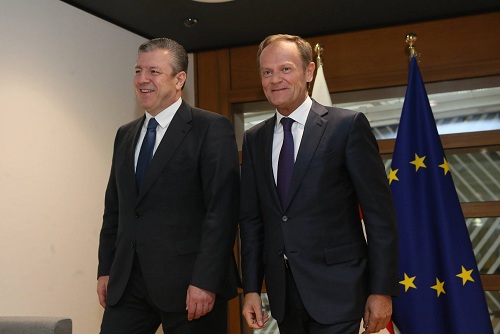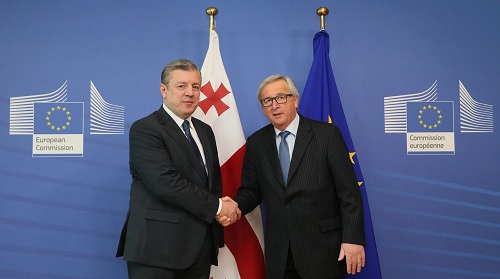
Prime Minister Giorgi Kvirikashvili and European Council President Donald Tusk, March 28, 2017. Photo: Government Administration
Prime Minister Giorgi Kvirikashvili, accompanied by cabinet ministers, MPs and a group of students, traveled to Brussels on March 28 to celebrate the launch of the visa-free regime to the European Union, following the delegation’s visit to Athens, Greece.
In Brussels, Prime Minister Kvirikashvili met with European Commission President Jean-Claude Juncker and European Council President Donald Tusk.
In his remarks made after the meeting with PM Kvirikashvili, Donald Tusk stressed that Georgia “has done a great job and achieved much.” “Today is a historic day for all of us but especially the Georgian people who from now on will be able to travel freely to the Schengen area. It is an important step to building an even closer EU-Georgia relationship,” Tusk stated.
The European Council President added that at the meeting with PM Kvirikashvili he “also paid tribute to the Government’s strong engagement within the Eastern Partnership and its concrete contributions to exploring new areas of collaboration ahead of the Summit this autumn.”
In his remarks, Donald Tusk also expressed concern over the latest developments “in the breakaway regions of Abkhazia and South Ossetia, in particular the closure of two crossing points along the Administrative Boundary Line with Abkhazia.” “While the European Union is opening its borders to Georgia, you have a neighbor that assists in creating new borders to limit your freedom, even inside your sovereign country,” he said.
The European Council President reaffirmed the EU’s “firm support” for the sovereignty and territorial integrity of Georgia and its “strong commitment” to a peaceful resolution of the conflict in Georgia, including through the Geneva International Discussions and the EU Monitoring Mission. “Continued efforts to engage with Abkhazia and South Ossetia remain crucial to achieving long-term solutions to these conflicts,” he concluded.
Speaking on the Rustavi 2 TV ownership dispute and Donald Tusk stated that the European Union “attaches great importance to media pluralism and looks forward to seeing concrete steps taken to ensure it.”
PM Kvirikashvili thanked the European Council President for supporting Georgia in achieving this “landmark accomplishment” and added that it will serve as “a strong incentive for further achievements towards the EU integration.” “During the meeting we discussed with the President a range of priorities and future steps, making the best use of novel opportunities of political association and economic integration with the EU, through full application of the Association Agreement as it is our highest priority in Georgian government,” Kvirikashvili explained.
The Prime Minister also expressed hope that the upcoming Eastern Partnership summit would “make a substantial input in making bonds between the EU and partners even stronger and in building future together.” "Georgia believes in its European future; we remain firmly committed to further progressive development of our ambitious relationships with the EU," Kvirikashvili stated.

Prime Minister Giorgi Kvirikashvili and European Commission President Jean-Claude Juncker, March 28, 2017. Photo: Government Administration
At his joint press briefing with Prime Minister Giorgi Kvirikashvili, European Commission President Jean-Claude Juncker emphasized that “the historic day for the people of Georgia and the European Union” came after “a long, sometimes difficult road” and that this was “possible only thanks to the ambitious and complex reform path undertaken by the Georgian government and by the Georgian people.”
“We supported Georgia every step of the way … And the more you reformed, the more we supported. But it is Georgia – its government and its people – that did all the hard work. Today’s decision is a testament to their efforts. Today is the beginning of a great success story,” he concluded.

 RSS
RSS Mobile
Mobile Twitter
Twitter Facebook
Facebook